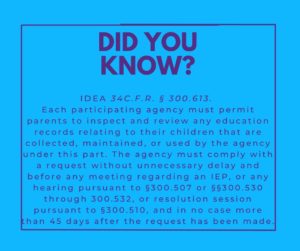 Every child deserves the best possible education, and as such, it is crucial to be informed about the rights and responsibilities surrounding their Individualized Education Program (IEP). An essential right under the Individuals with Disabilities Education Act (IDEA) is the ability to review all assessments and evaluations used to make decisions in your child’s IEP before the meeting.
Every child deserves the best possible education, and as such, it is crucial to be informed about the rights and responsibilities surrounding their Individualized Education Program (IEP). An essential right under the Individuals with Disabilities Education Act (IDEA) is the ability to review all assessments and evaluations used to make decisions in your child’s IEP before the meeting.
IDEA 34C.F.R. § 300.613 mandates that each participating agency must allow parents to inspect and review any education records relating to their children that are collected, maintained, or used by the agency under this part. This provision aims to promote transparency and collaboration in developing an appropriate and effective IEP for children with disabilities.
Understanding the importance of reviewing assessments and evaluations
The process of reviewing assessments and evaluations plays a crucial role in ensuring your child’s educational journey is on the right track. By gaining access to these records, you can understand the information and data that have been used to make decisions about your child’s education. Armed with this knowledge, you can ask relevant questions and address any concerns during the IEP meeting.
Here are some key points to keep in mind when requesting to review assessments and evaluations:
- Make the request in writing: To ensure adequate time for a thorough review, submit your request in writing well before the scheduled IEP meeting. A written request also serves as documentation, ensuring that you have formally asked for access to the relevant records.
- Coordinate with the school or educational agency: Reach out to your child’s school or the appropriate educational agency to make your request. They should provide you with the necessary information and access to the assessments and evaluations in a timely manner.
- Understand the assessments and evaluations: Take the time to carefully review each assessment and evaluation provided. Seek clarification from the school or educational professionals if there are any terms or concepts you don’t understand.
- Ask questions and voice concerns: Your active participation in the IEP process is invaluable. During the IEP meeting, don’t hesitate to ask questions about the assessments or evaluations and express any concerns you may have. Share insights into your child’s strengths, challenges, and specific needs to help shape an effective IEP.
- Collaborate with the IEP team: The IEP team, consisting of teachers, therapists, and other professionals, is there to support your child’s educational journey. Work collaboratively with them to create a comprehensive and personalized IEP.
Active involvement and advocacy in the IEP process are essential for parents. Reviewing assessments and evaluations empowers parents to make informed decisions about their child’s education. By working closely with the IEP team, parents can ensure their child’s strengths are nurtured, challenges are addressed, and a successful and fulfilling education is achieved.
The right to review assessments and evaluations before the IEP meeting is a critical aspect of being an informed and engaged participant in your child’s educational journey. Understanding the data and information used to develop your child’s IEP empowers you to collaborate effectively with the IEP team and support your child’s educational success.
